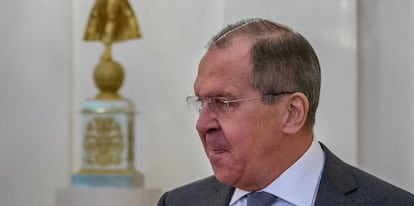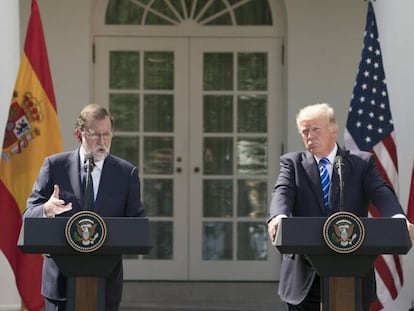Russian espionage chief accuses Spain of ¡°repression¡± over Catalonia
During a conference speech, Sergei Naryshkin criticized the ¡°brutal violence¡± used by Spanish authorities at the October 1 independence referendum


The director of Russia¡¯s foreign intelligence services, Sergei Naryshkin, has accused the Spanish authorities of ¡°political repression¡± against the promoters of the Catalan independence referendum, which went ahead on October 1 despite having been declared illegal by Spain¡¯s Constitutional Court. He also criticized the ¡°brutal police violence¡± used by security forces at some polling stations during the vote.
The Russian official¡¯s declarations came shortly after Spanish Prime Minister Mariano Rajoy confirmed that Russian and Venezuelan hackers had intervened during the Catalan crisis. Naryshkin described the actions of the Catalan regional government as ¡°the supreme form of democratic expression of popular will¡± during a speech he made at a conference dedicated to the 30th anniversary of the founding of the Institute of Europe (IE). Integrated within the?Russian Academy of Sciences, the IE is dedicated to studying the continent¡¯s issues and creating reports and ideas for Russian foreign policy.
When the results of the referendum made them uncomfortable, they subjected voters to political repression Sergei Naryshkin
The European elites, said Naryshkin, ¡°continue to position themselves as exemplary bearers of democracy. However, in Catalonia, when the results of the referendum ¨C as the supreme form of democratic expression of the popular will ¨C made them uncomfortable, they not only refused to recognize them, but also subjected the initiators of the vote to political repression and the participants in support of independence to brutal police violence.¡±
Naryshkin mentioned Catalonia along with other topics in a critical take on EU policy. The head of Russian espionage made a ¡°historical parallel¡± and a ¡°curious¡± comparison between the behavior of the Spanish government and the young Soviet Russia, which granted independence to Finland in 1917, because it was a ¡°just decision from a historical and truly democratic perspective.¡± ¡°The authorities of Spain, a member of the EU, a country that considers itself to withhold the rule of law, acted differently,¡± Naryshkin said.
Naryshkin added that Russia is interested in the EU being a ¡°strong, reliable and stable development partner¡±
Among those attending the IE event was the head of the international relations commission for the Federation Council, Konstantin Kosachov, and the Russian representative for NATO, Alexander Grushko. The attendees noted the progressive distancing between the EU and Russia.
Naryshkin worked with Russian President Vladimir Putin at the mayor¡¯s office in St. Petersburg and became head of the lower house of parliament, the Duma, in the fall of 2016, before going on to direct the foreign espionage service.
The official stressed that his intervention was ¡°based on an analysis of information¡± that had reached the department he is in charge of. Naryshkin added that Russia is interested in the EU being a ¡°strong, reliable and stable development partner.¡±
Harming relationships
The words of the espionage chief were not the only reference from a Russian official to be made on Thursday. The spokesperson for the Russian Ministry of Foreign Affairs, Maria Zaj¨¢rova, said that accusations of ¡°Russian interference¡± in Catalonia ¡°harm relations¡± between the two countries. ¡°We would like our Spanish colleagues to begin to respond to their words and present concrete facts,¡± the spokesperson said.
English version by Debora Almeida.
Tu suscripci¨®n se est¨¢ usando en otro dispositivo
?Quieres a?adir otro usuario a tu suscripci¨®n?
Si contin¨²as leyendo en este dispositivo, no se podr¨¢ leer en el otro.
FlechaTu suscripci¨®n se est¨¢ usando en otro dispositivo y solo puedes acceder a EL PA?S desde un dispositivo a la vez.
Si quieres compartir tu cuenta, cambia tu suscripci¨®n a la modalidad Premium, as¨ª podr¨¢s a?adir otro usuario. Cada uno acceder¨¢ con su propia cuenta de email, lo que os permitir¨¢ personalizar vuestra experiencia en EL PA?S.
?Tienes una suscripci¨®n de empresa? Accede aqu¨ª para contratar m¨¢s cuentas.
En el caso de no saber qui¨¦n est¨¢ usando tu cuenta, te recomendamos cambiar tu contrase?a aqu¨ª.
Si decides continuar compartiendo tu cuenta, este mensaje se mostrar¨¢ en tu dispositivo y en el de la otra persona que est¨¢ usando tu cuenta de forma indefinida, afectando a tu experiencia de lectura. Puedes consultar aqu¨ª los t¨¦rminos y condiciones de la suscripci¨®n digital.
More information

US ¡°very concerned¡± about claims of Russian meddling in Catalonia









































